Spring Is the Time for Slinging Slime
Surprising as it might be, that title is not a description of the presidential election. Rather, it refers to the yearly necessity of cleaning out the accumulated rotting organic material and slimy stuff from my backyard pond after the winter. Yes, this is a real muckraking diary!
This may be a strange diary for a political site, but we all need a break from politics now and then, so I wanted to share with you something that brings me joy, relaxation, and renewal.
Maybe together we can answer the age old question...
If water is so darn precious, why do we let fish poop in it?
- Stephen Colbert
I have always liked water, fish, other aquatic and semi-aquatic wildlife, and beaches. Maybe that's because I'm a Pisces. Ever since I read a book about feng shui and the various elements that go into creating a balanced and harmonious environment, I have wanted to have a water feature in my home environment for the nurturing energy that flowing water brings.
When I lived in Santa Cruz, California, I was within 2 miles of the beach, so I could walk there, and I had a large aquarium in my living room.
About a year and a half ago, I moved to Baltimore, Maryland, but after seeing An Inconvenient Truth, I decided not to buy property in a low-lying area near the water. My house is not within walking distance of the Chesapeake Bay, but I did manage to find a house that came with a fish pond in the back garden. I like this house anyway, and I like the neighborhood, but the fish pond sort of clinched the deal.

Caring for a backyard pond has been a new and exciting experience, although I must admit I wasn't the best caretaker for the pond during the Edwards campaign. It got somewhat neglected during that time, but as it is a mini ecosystem unto itself, mostly it survived without getting too out of whack.
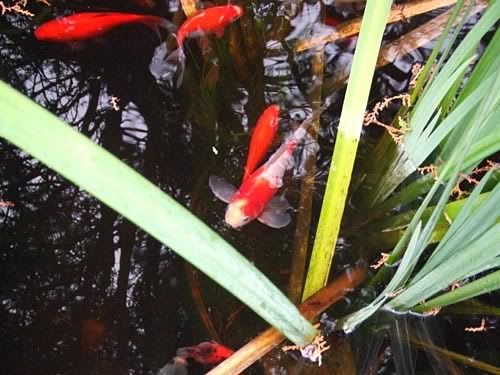
There are goldfish in my pond. They came with the house too, except for the ones that have been spawned since then. I've never added any fish to the pond, because the ones I have just keep breeding. Occasionally some of them die or disappear too. There are certainly cats in the neighborhood, and I've also occasionally seen a big blue heron, who is beautiful, but eyes my pond a little too closely. This has been a good lesson on the Buddhist theme of impermanence. It doesn't pay to get too attached to any one fish.
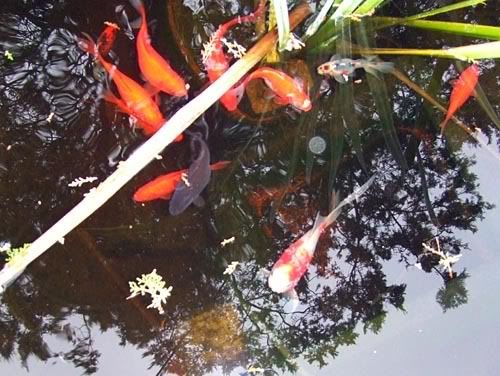
Over the winter, the fish stay in the pond and when it's cold enough, the pond freezes over. The fish become inactive, and mostly stay very still at the bottom of the pond. They don't need to eat during this time. It's important to keep a hole in the ice, so that foul gases from decaying organic matter and fish poop can escape. Otherwise, it would kill the fish. I can keep a hole in the ice by continuing to run the pumps for the waterfall. The movement of the water keeps it from freezing.
In the spring, it's time to clear all the decaying leaves, the ever present fish poop, and usually a couple of dead fish out of the pond. Since this is the first time I've had a pond, I'm really not an expert on that, so I've consulted various books and websites for how to do that.
The first advice that I came across for a spring clean out involved completely draining the pond, catching the fish and putting them in a temporary container, such as a kids inflatable wading pool. cleaning all the muck out of the bottom, and power washing the pond. This is probably really very desirable, but wasn't something that I felt up to doing myself the first year that I owned the pond.
What I ended up doing instead was partially draining the pond, so I could see how much muck was on the bottom, using a net to scoop out a lot of the muck, and then gradually replacing the water. I knew from owning an aquarium before that you don't want to add too much tap water to the water at one time, because it contains chlorine and will harm the fish and kill off the beneficial bacteria.
Actually, this latter strategy seemed to have worked OK, although this year I don't think I will take a lot of water out of the pond, because it probably keeps the balance better if I don't.
I've already done some of the spring clean out this year. I cut back the water irises and removed a bunch of dead leaves and debris from the water. When it gets warmer, I'll need to get some beneficial bacteria additive that I can put in the water to help the remaining muck go through its process of decay at the bottom of the pond.
The pond water is kind of green, which means there is quite a bit of microscopic floating algae in there. This isn't really bad, so long as it doesn't get out of control, because it helps oxygenate the water.
Last year, I used some algae killer chemical to control the algae, but as I was getting it out this year, I noticed the warning on the package about how it contained a chemical known to the State of California to cause cancer, and decided against using that. I'm not sure how the State of California knows so much more about the dangerous properties of chemicals than other states, but I'm willing to take their advice.
I finally turned to the Creative Homeowner Ponds & Fountains Smart Guide that I bought a while back at Home Depot or Lowe's and had never really cracked open. From that I learned...
It is normal for a pond to have excess algae growth until aquatic plants have established themselves. Submerged plants (oxygenating grasses) eventually starve out the algae by consuming available nutrients directly from the water. Surface plants like water lilies and various floating plants also consume nutrients and they cut off the sunlight needed for algae to grow. The addition of fish and snails, and the eventual unplanned introduction of algae eating insects like water fleas, also help to control algae, but to a lesser degree than plants.
The guide further informed me that when starting a new pond, I should start with...
Two bunches of submerged plants (oxygenating grasses) per square yard of pond surface area.
Well, isn't that interesting? There are some of what the guide calls bog plants in my pond, irises and water lilies, but apart from a few stray scraggly weeds, there are approximately zero bunches of submerged oxygenating grasses. I estimate that given my pond size, I should probably have at least eight. Maybe if I had that, my water wouldn't be so green.
Another thing I keep seeing recommended is snails, and although I've seen a few very small ones, I don't think I have the right number of those either.
I went out to Valley View Farms, which seems to be the main place in my area that people talk about as having a good water gardening department, but I learned that it's too early for them to have the oxygenating plants, because we could still get frost. I had gotten too excited by a few very nice days, and of course where I used to live in California, spring is already well underway.
Instead, I bought some rocks that enabled me to redo and move my waterfall. The water had previously been falling away from the house, which I didn't like because it was carrying energy away, when I looked at it from my limited understanding of feng shui.
I changed the direction of the tube coming from the pump, and moved the waterfall to the other side of the pond, so that it is now cascading over rocks toward the house. I am much more pleased with it.

I also cleaned out the pump filter, which increased the water flow.
Rocks, crystals, and plants could be added around the waterfall to improve the appearance, but this is a nice start, and I can collect the rocks from places that I visit.
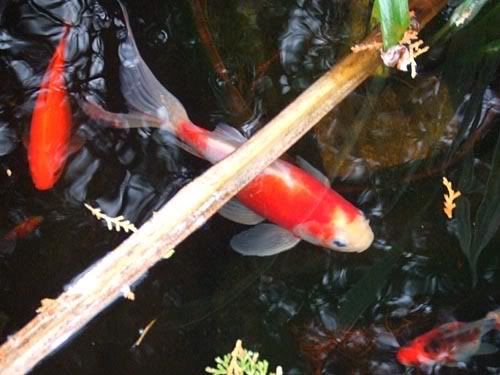
Ah! The sound of water is so relaxing!
What have I learned from a little over a year of water gardening?
Don't put chemicals in the water that are known to the State of California to cause cancer. (Always good advice!)
To everything, turn turn turn, there is a season, turn turn turn, and a time for every purpose under heaven.
A fish in the pond is worth two in the blue heron's stomach.
If you give a man a fish, he will eat for a day. If you teach him to fish, KEEP HIM AWAY FROM MY POND! I have enough trouble with the blue heron.
And yes, Stephen Colbert, water is precious, even if it has fish poop in it. Just ask the squirrel that drinks out of my pond.
I leave you with some photos of ponds in a park not too far from my neighborhood. These ones are slightly larger than my own.
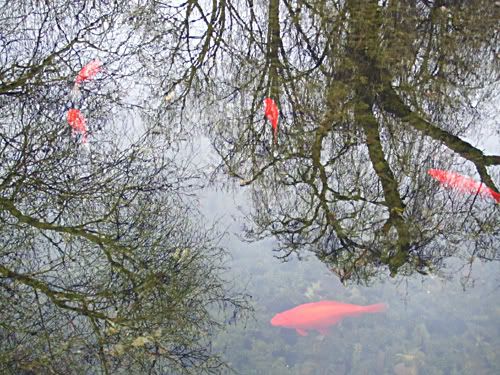
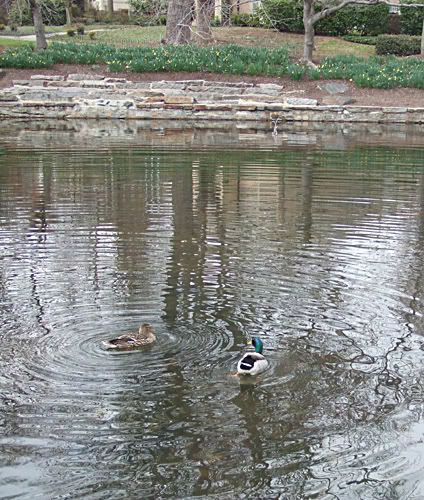
In a few weeks, that place will look like this:

For now, enjoy the first of the spring flowers.

Labels: environment, Fish, goldfish, hobbies, Koi, pond, water


1 Comments:
Very nicely done...
June 25, 2008
Post a Comment
Subscribe to Post Comments [Atom]
<< Home